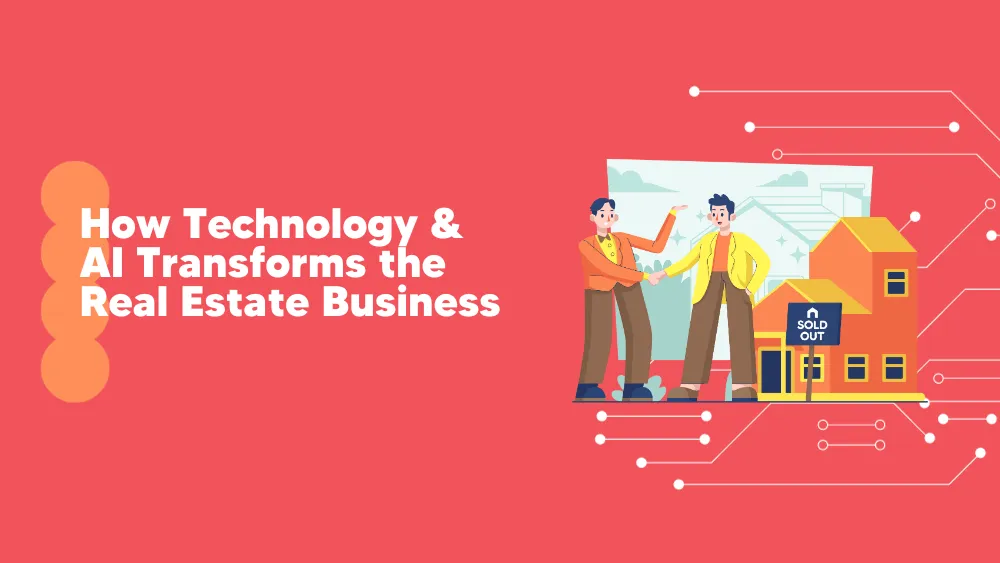Table of Contents
The real estate business, often considered a bastion of tradition and conservatism, has evolved remarkably over the past few decades. What was once a sector heavily reliant on face-to-face interactions, paperwork, and analog processes is now being reshaped by the relentless march of technology and the advent of Artificial Intelligence (AI).
For instance, property listings were limited to printed classifieds and word-of-mouth referrals in the pre-digital era. Property viewings necessitated physical visits, often consuming substantial time and effort for buyers and sellers.
Additionally, the property valuation process was largely subjective, based on the experience and intuition of appraisers.
However, with the advent of the internet and digital technologies, the real estate landscape shifted dramatically. Online listings and searchable databases made property information accessible to a global audience.
As we journey through this article, we will explore how technology and AI have catalyzed further changes in the real estate sector, making it one of the most exciting and dynamic industries in the modern world.
The Rise of PropTech
In recent years, a new buzzword has been echoing throughout the real estate business: PropTech, short for Property Technology.
PropTech represents a groundbreaking convergence of real estate and technology, and its significance cannot be overstated. To comprehend its profound impact, let’s start by defining PropTech and why it matters.
What is PropTech
At its core, PropTech is about harnessing the power of technology to streamline and enhance every facet of the real estate experience.
The significance of PropTech lies in its ability to address long-standing challenges and inefficiencies within the real estate business. Traditionally, real estate transactions were laden with cumbersome paperwork, time-consuming processes, and a lack of transparency. Property searches required extensive legwork, and property management often relied on manual, error-prone systems.
However, PropTech has changed the game entirely. It has ushered in a new era where property transactions can occur swiftly, with greater transparency and convenience for all parties involved. Buyers and renters can now browse property listings from their homes, view 3D virtual tours, and access detailed information about a property’s history, pricing, and neighborhood data. Sellers and landlords can use digital platforms to market their properties to a broader audience, simplifying the process and reducing marketing costs.
The heart of the PropTech revolution lies in integrating software and digital platforms into the traditional real estate landscape. This integration has far-reaching implications that touch every aspect of the industry:
Property Search and Discovery
Digital platforms have become the go-to resource for property seekers. Online databases and real estate websites aggregate listings from various sources, making it easy for potential buyers or renters to find their ideal properties. Advanced search filters, geospatial data, and predictive analytics refine the search process, ensuring users are presented with properties that match their specific criteria.
Property Marketing and Sales
For property owners and real estate agents, digital platforms provide powerful tools for marketing and selling properties. High-quality images, virtual tours, and interactive floor plans enhance property listings, attracting more prospective buyers or tenants. Additionally, social media and digital advertising strategies can target specific demographics, further expanding the reach of property listings.
Property Management
Managing properties has become more efficient with the introduction of property management software. Landlords and property managers can automate rent collection, track maintenance requests, and monitor property performance in real-time. These digital solutions help reduce administrative burdens and enhance the overall experience for property owners and tenants.
Data Analytics and Market Insights
PropTech platforms collect vast amounts of data on real estate transactions, market trends, and customer preferences. This data is invaluable for market analysis, enabling stakeholders to make data-driven decisions. Predictive analytics can forecast property values, rental yields, and market dynamics, empowering investors and developers to optimize their strategies.
Therefore, based on these accounts and facts, the rise of PropTech represents a seismic shift in the real estate business driven by the integration of software and digital platforms. This transformation is marked by increased efficiency, transparency, and accessibility throughout the real estate lifecycle.
AI in Real Estate Business
Artificial Intelligence (AI) is not just a futuristic concept; it’s a transformative force that has already permeated virtually every industry, including real estate. AI has emerged as a game-changer in property transactions and management, offering innovative solutions that enhance accuracy, efficiency, and personalization.
Let’s explore how AI is being harnessed in the real estate sector and the benefits it brings.
Property Valuations
One of the most profound ways AI impacts the real estate industry is through property valuations. Traditionally, property appraisals relied heavily on manual methods and the expertise of appraisers. However, AI-driven algorithms and machine learning models have revolutionized this process. AI can analyze vast datasets of property-related information, including historical sales data, neighborhood trends, and property features, to provide highly accurate valuations.
The benefits of AI in property valuations are two-fold: accuracy and speed. AI can assess properties objectively, eliminating human bias and subjectivity. Additionally, AI-powered valuation tools can produce property estimates in seconds, a task typically taking days or weeks when done manually. This speed and precision are invaluable for buyers, sellers, and lenders seeking reliable property values.
Predictive Analytics
AI’s predictive capabilities are another asset to the real estate industry. Predictive analytics, driven by AI algorithms, can forecast future market trends, property values, and investment opportunities. By analyzing historical data and current market conditions, AI can provide insights into which neighborhoods are likely to experience growth, helping investors make informed decisions.
Furthermore, predictive analytics can assist real estate professionals in optimizing pricing strategies. For instance, AI can suggest optimal rental rates based on location, property type, and market demand, ensuring that properties are competitively priced to attract tenants and maximize returns.
Customer Service (e.g., Chatbots)
AI-driven chatbots and virtual assistants are transforming customer service in the real estate sector. Chatbots are available 24/7 to answer inquiries, schedule property viewings, and provide information about listings. They can engage with potential buyers or renters, guiding them through the initial stages of their property search. Chatbots are not limited by human constraints like working hours, making them an invaluable tool for providing timely and responsive customer support.
Moreover, AI-driven customer service can personalize interactions. These systems can learn from user behavior and preferences to tailor responses and recommendations. For example, a chatbot can remember a user’s property preferences and provide updates on listings that match their criteria, enhancing the customer experience.
The adoption of AI in real estate brings about a multitude of advantages. First and foremost, it significantly enhances accuracy, reducing the margin for error in property valuations, market predictions, and customer interactions. This accuracy instills confidence in stakeholders, whether buyers, sellers, investors, or tenants, ultimately leading to more informed decision-making.
Secondly, AI-driven processes are exceptionally efficient. They can handle tasks that would take humans significantly longer, allowing real estate professionals to focus on higher-value activities. For instance, AI can process large datasets in a fraction of the time it would take a human analyst, enabling quicker decision-making.
Lastly, AI enables highly personalized experiences. Whether tailoring property recommendations, providing timely responses, or customizing marketing strategies, AI ensures that individuals receive information and services that align with their needs and preferences.
So, AI is rapidly reshaping the real estate industry by enhancing property valuations, predictive analytics, and customer service through innovations like chatbots. The benefits of increased accuracy, efficiency, and personalized experiences streamline processes and empower stakeholders to make more informed and satisfying real estate decisions.
Virtual Reality (VR) and Augmented Reality (AR) Tours
Other paramount concepts to consider: Virtual Reality (VR) and Augmented Reality (AR) are not just buzzwords in the tech world, but they are transforming how we experience and interact with the real estate market. These immersive technologies have opened up new frontiers in property viewings, offering a glimpse into the future of real estate transactions. In this section, we’ll explore how VR and AR are revolutionizing property viewings and the myriad advantages they bring to both buyers and sellers, such as:
Convenience
Gone are the days when property viewings required prospective buyers or tenants to visit multiple locations physically. VR and AR have ushered in an era of unparalleled convenience. With VR headsets or AR-compatible devices like smartphones or tablets, individuals can explore properties from the comfort of their homes. This eliminates the need for time-consuming travel, scheduling conflicts, and the logistics associated with coordinating viewings.
Virtual property tours, enabled by VR, allow users to “walk through” a property as if they were physically present. They can inspect every nook and cranny, view the layout, and get a genuine feel for the space. AR, conversely, superimposes digital information onto the real world, making it possible to visualize how furniture and decorations would fit into a space. This level of convenience saves time and widens the reach of property listings to potential buyers or renters who may be located far away.
Immersive Experience
VR and AR offer an immersive experience that transcends traditional property listings. Virtual property tours, in particular, create a sense of presence unmatched by static images or even video tours. Users can look up, down, and around, understanding the property’s layout, design, and ambiance. In the case of AR, users can interact with properties in real-time. For example, they can change wall colors, move virtual furniture, or even simulate different lighting conditions to visualize how the property would suit their preferences.
Cost-Effectiveness
For both buyers and sellers, VR and AR offer cost-effective solutions. Sellers can reduce expenses related to traditional open houses, including staging, travel, and marketing materials. Virtual tours can be created and shared digitally, reaching a global audience without significant costs.
On the other hand, buyers can save money on travel expenses when exploring properties in distant locations. This is especially advantageous for international buyers or those moving to new cities. Additionally, the immersive nature of VR and AR reduces the likelihood of wasted trips to properties that may not meet the buyer’s criteria.
Moreover, VR and AR tours are available around the clock. Prospective buyers or renters can view properties at any time that suits them, eliminating the constraints of traditional viewing hours. Ultimately, in an era where convenience and innovation reign supreme, virtual property tours, VR property viewings, and AR have emerged as a game-changing trend in the real estate industry. These tours leverage cutting-edge technologies like Augmented Reality (AR) and Virtual Reality (VR) to redefine the property viewing experience.
Big Data and Market Analysis
In the dynamic world of real estate, staying ahead of the curve requires more than instinct and experience. It demands the ability to decipher complex market trends, understand evolving customer preferences, and craft effective pricing strategies. Enter big data – the driving force that is revolutionizing how the real estate industry operates.
This section will show how big data transforms market analysis and its profound impact on the real estate landscape.
Market Trends Unveiled
With its vast datasets and advanced analytics tools, big data offers real estate professionals unparalleled insights into market trends. It empowers industry stakeholders to monitor and comprehend market dynamics, including fluctuations in property prices, demand and supply patterns, and emerging neighborhood trends. For instance, by analyzing historical sales data, big data can reveal seasonal patterns in the real estate market. This information enables estate agents, investors, and developers to strategize effectively. They can plan property listings, launches, and marketing campaigns during peak demand periods, maximizing their chances of success.
Customer Preferences Explored
Understanding customer preferences is paramount in the real estate industry. What do buyers and renters desire in a property? How do their preferences change over time? Big data holds the key to answering these critical questions.
Through data-driven analysis, real estate professionals can gain insights into their target audience’s features, amenities, and location preferences. They can identify the factors that drive decision-making and tailor their property listings and marketing strategies accordingly.
Pricing Strategies Perfected
As we know, pricing is a delicate balancing act in the real estate business. Properties must be priced competitively to attract buyers or renters yet priced to maximize returns for sellers and landlords. Big data plays a pivotal role in optimizing pricing strategies.
Big data-driven algorithms can calculate optimal listing prices by analyzing historical sales data, local market conditions, and property features. These algorithms consider comparable property sales, neighborhood trends, and economic indicators, ensuring that prices are market-appropriate and competitive.
Moreover, real-time data feeds enable dynamic pricing strategies. In rapidly changing markets, prices can be adjusted to reflect shifts in demand and supply. For instance, during a housing shortage, prices can be adjusted upward, while in a buyer’s market, prices can be adjusted downward to attract more interest.
Challenges and Concerns in the Real Estate Business
While integrating technology, AI, and big data promises to transform the real estate business, it also brings forth challenges and concerns that must be carefully navigated. This section will explore some critical issues facing the real estate sector as it embraces these digital innovations.
Data Privacy Issues
The increasing reliance on technology and data analytics in the real estate industry raises significant data privacy concerns. The risk of data breaches and privacy violations grows as vast amounts of personal and property-related data are collected and processed. Buyers, sellers, and tenants entrust sensitive information to real estate agents, platforms, and service providers. This information includes financial records, credit histories, and personal details. Protecting this data from unauthorized access and cyberattacks is of utmost importance.
To address data privacy challenges, the industry must adhere to strict data protection regulations and implement robust cybersecurity measures. Real estate professionals should prioritize the secure storage and transmission of sensitive information, ensuring that clients’ privacy is safeguarded throughout the transaction process.
The Digital Divide
As technology becomes increasingly integral to the real estate business, concerns about the digital divide emerge. Not all individuals or communities have equal access to the digital tools and resources needed to participate fully in the evolving real estate landscape. This digital divide can exacerbate existing inequalities in access to housing and opportunities.
To bridge the digital divide, real estate professionals and policymakers must work together to ensure that technology is accessible to all. Initiatives such as improving internet infrastructure in underserved areas, providing digital literacy training, and offering alternative channels for those without internet access are essential to creating a more inclusive real estate ecosystem.
The Need for Upskilling
The rapid evolution of technology in real estate necessitates a workforce that is well-versed in digital tools and data analysis. Real estate professionals must upskill time and relevant, from agents to property managers, and remain competitive. This upskilling involves learning to navigate new software platforms, understand AI-driven analytics, and interpret big data. Real estate professionals must also adapt their communication strategies to effectively engage with tech-savvy clients and provide the personalized experiences that today’s buyers and renters expect.
To address the need for upskilling, industry associations, educational institutions, and employers can offer training programs and resources. Continuing education and professional development opportunities can empower real estate professionals to thrive in the digital age.
Regulatory Challenges
The regulatory landscape in the real estate business is also evolving to address the challenges posed by technology and data-driven practices. Regulations surrounding data privacy, fair housing, and property disclosures are being adapted to align with the digital era. Real estate professionals must stay informed about these regulatory changes to ensure compliance. Failure to do so can result in legal consequences and damage to reputation. Additionally, the industry should actively engage with regulators to help shape policies that balance innovation and consumer protection.
As highlighted so far, the digital transformation of the real estate industry brings challenges and concerns that need to be taken care of carefully.
As the industry adapts to these challenges, it can harness the full potential of technology and data to provide better experiences and outcomes for all participants in the whole real estate ecosystem.
Conclusion
Our journey in this article has illuminated the remarkable transformative power of technology, AI, big data, and digital innovations in the real estate business. From the rise of PropTech, which seamlessly integrates digital platforms and software into traditional practices, to the infusion of Artificial Intelligence (AI) in property valuations, predictive analytics, and customer service, technology has entered an era of unparalleled accuracy, efficiency, and personalized experiences.
Virtual Reality (VR) and Augmented Reality (AR) tours have revolutionized property viewings, offering unmatched convenience, immersive experiences, and cost-effectiveness. These innovations have eliminated geographical barriers and enriched property exploration, fundamentally altering how we interact with properties.
Yet, as with any transformation, there come challenges. Data privacy concerns, the digital divide, and the need for upskilling represent hurdles that must be surmounted. Striking the right balance between innovation and protection, inclusivity, and accessibility is paramount as we navigate this digital frontier.
So, embracing these innovations while addressing the associated challenges will be the key to thriving in the digital age of real estate.





